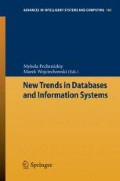Abstract
Bidding languages are well-defined for combinatorial auctions. However, the auctions of divisible goods are quite common in practice. In contrast to combinatorial auctions, in a case of divisible commodities, the feasible volumes of offers are continuous. Thus, we call such auctions as continuous auctions. In the paper we introduce three families of bidding languages for continuous auctions. Their are based on the concepts derived from the combinatorial auctions. We generalize the language families based on goods, bids, and some mixture of both of them, to the continuous case. We also present preliminary analysis of their properties. Simple examples, reflecting the complementarity and substitutability, are provided with the exemplary representations in different languages.
Access this chapter
Tax calculation will be finalised at checkout
Purchases are for personal use only
Preview
Unable to display preview. Download preview PDF.
References
Benyoucef, M., Pringadi, R.: A BPEL Based Implementation of Online Auctions. In: Georgakopoulos, D., Ritter, N., Benatallah, B., Zirpins, C., Feuerlicht, G., Schoenherr, M., Motahari-Nezhad, H.R. (eds.) ICSOC 2006. LNCS, vol. 4652, pp. 104–115. Springer, Heidelberg (2007)
Boutilier, C., Hoos, H.H.: Bidding languages for combinatorial auctions. In: Proc. 17th Intl. Joint Conference on Artif. Intell. (2001)
Hoos, H.H., Boutilier, C.: Solving combinatorial auctions using stochastic local search. In: Proceedings of the Seventeenth National Conference on Artificial Intelligence, pp. 22–29 (2000)
Kaleta, M., Traczyk, T. (eds.): Modeling Multi-commodity Trade. AISC, vol. 121. Springer, Heidelberg (2012)
Lehmann, D., Müller, R., Sandholm, T.: The winner determination problem. In: Cramton, P., Shoham, Y., Richard, S. (eds.) Combinatorial Auctions, ch. 12. MIT Press (2006)
Nisan, N.: Bidding and allocation in combinatorial auctions. In: Proceedings of ACM Conference on Electronic Commerce, pp. 1–12 (2000)
Rolli, D., Eberhart, A.: An auction reference model for describing and running auctions. In: Proc. of the Wirtschaftsinformatik (2005)
Author information
Authors and Affiliations
Corresponding author
Editor information
Editors and Affiliations
Rights and permissions
Copyright information
© 2013 Springer-Verlag Berlin Heidelberg
About this paper
Cite this paper
Kaleta, M. (2013). Bidding Languages for Continuous Auctions. In: Pechenizkiy, M., Wojciechowski, M. (eds) New Trends in Databases and Information Systems. Advances in Intelligent Systems and Computing, vol 185. Springer, Berlin, Heidelberg. https://doi.org/10.1007/978-3-642-32518-2_20
Download citation
DOI: https://doi.org/10.1007/978-3-642-32518-2_20
Publisher Name: Springer, Berlin, Heidelberg
Print ISBN: 978-3-642-32517-5
Online ISBN: 978-3-642-32518-2
eBook Packages: EngineeringEngineering (R0)

